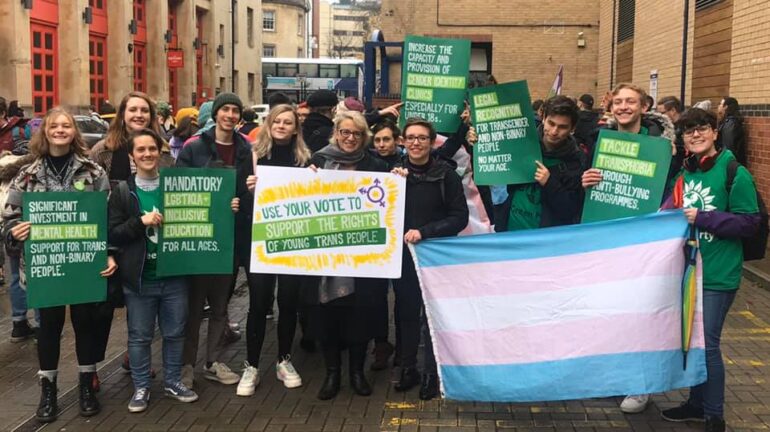Tory Women: why “female” and “feminist” aren’t interchangeable
The current government’s spending cuts disproportionately affect women. That’s not my opinion; it’s fact. Women make up 65% of the public sector workforce, so are more likely to be affected by the redundancies and pay freezes which are being imposed. Most single parents and housing benefit claimants are women, so more women than men will be affected by cuts to benefits. Women do more unpaid work, such as looking after children and helping elderly or disabled relatives around the house, so when Surestart centres and social care are affected, it increases women’s workloads. And as Legal Aid and the organisations which support the survivors of domestic violence – the vast majority of whom are female – lose their funding, it becomes more difficult for women escape abusive relationships and rebuild their lives. Tory policies are an absolute disaster for gender equality, and for millions of women’s quality of life, so it’s pretty fair to say that the cuts are a feminist issue.
Last weekend I attended the UK Feminista conference in London, where one of the sessions was a Feminist Question Time. One of the more memorable questions came from a woman who asked if the reason that the current government pursue such anti-feminist policies is because there are so few women in the government. In response, Shami Chakrabati, director of Liberty and a member of the panel, took the opportunity to remind us that, even though only five of the twenty-three members of the cabinet are female, the Tories have improved their representation of women in recent years, and suggested that they deserve some credit for it. Five out of twenty-three might not sound particularly impressive, but considering that there were never more than two women in the Cabinet when John Major was Prime Minister, and Margaret Thatcher only appointed two women in the whole of her eleven years in Downing Street, Cameron’s government is relatively progressive by Tory standards.
However, the fact that the cabinet is a little closer to an equitable gender ratio than it was 15 years ago doesn’t necessarily mean that the Tories are any more feminist. If the presence of female politicians automatically made a Conservative government more feminist, the 1980s would have been very different. A few extra Tory women around the table doesn’t really change things because, men or women, they’re still Tories. Some people might say that women have a different perspective, and yes that’s probably true, but unfortunately some members of oppressed or marginalised groups will choose to collaborate with their own oppression (disclaimer: other forms of oppression are also available, but I’m concentrating on sexism here) .
Supporting one’s oppressor might seem counter-intuitive, but it does make sense from an individualistic point of view. Nadine Dorries is contributing to the oppression of other women every time she publicly expresses her views on sex education and abortion counselling, but on a personal level she has done pretty well out of it. She has a very safe parliamentary seat (at least until it disappears in the boundary changes at the next election), enjoys an unusually high profile for a backbench MP, and seems to be popular with the right-wing media. Even though she’s a hate figure for the left, she has influence and celebrity status beyond what many of the more openly feminist female MPs could hope for. This is because a woman who is prepared to accept, and even embrace, the patriarchy is often more welcome in male-dominated settings than a feminist woman; letting her join in is an easy token gesture towards equality, because she doesn’t want to change the status quo.
The fact that men – and in particular, affluent white men – have more power in society than women, means that they will often have power over women, which can be used to control our behaviour. For relatively privileged women, this might mean that men are the gatekeepers to power and opportunity, and gaining their approval makes life easier, but we must not forget that many women are in a more precarious position. Sometimes behaving within the accepted feminine limits is a survival tactic, because transgressions can be used as a justification for domestic abuse, “corrective” rape, or honour-related violence. But prominent female Tory politicians are in a position of relative privilege, and it’s highly unlikely that anything other than their political careers were on the line when they decided to support the anti-feminist cuts agenda.
In the short-term, the individual benefits of supporting patriarchy can outweigh those of confronting it, but even as one woman benefits, women as a group suffer. Female Tory MPs have chosen to use the advantages that they’ve been given through talent, education or social class to protect their own position in society, rather than work towards equality. This shouldn’t be surprising, because Tory men do exactly the same thing: it’s part of what makes them Tories. The only statement female Conservative MPs are making on gender equality is that they can be just as ruthlessly right-wing as their male counterparts.


This article captures exactly the complexity of women issues in the society that I’ve been grappling to entangle!
I still believe having half the elected Tories being female
would significantly change all that
#ladieschangetheworldmovement